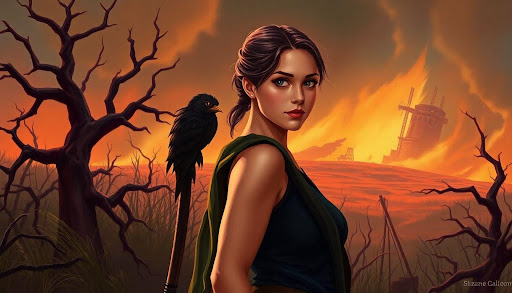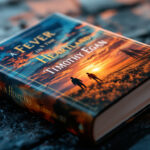‘Legend’ by Marie Lu – A Young Adult Dystopian Adventure Review
Marie Lu’s Legend has sparked the imaginations of young adult readers worldwide. Set in a gripping dystopian future, it draws you into a world where the United States has splintered into the Republic, a nation perpetually at war. At its core, the book follows two teenagers, Day, a notorious criminal, and June, a prodigious military recruit, each from contrasting social backgrounds. Their stories unfold through alternating perspectives, offering a rich tapestry of action, intrigue, and emotional depth. Readers often find themselves captivated by the characters’ journey from foes to allies, all underpinned by an exciting, fast-paced narrative. Whether you’re a seasoned bookworm or just dipping your toes into dystopian fiction, Legend promises an immersive experience that keeps you on the edge of your seat.
Overview of the Plot
In Marie Lu’s Legend, readers are transported to a dystopian future where the former United States has splintered into a militarized nation called the Republic. This section delves into the intricacies of this vividly crafted world, introducing the intriguing characters and exploring the complex conflicts that drive the narrative forward.
Setting the Scene
The backdrop of Legend is a fractured society dominated by the Republic, a powerful regime constantly engaged in warfare. Lu masterfully crafts a world where socioeconomic divisions are stark. Cities are divided into sectors, with the elite residing in luxurious sectors, while the impoverished live in squalor. This setting not only amplifies the tension in the story but also serves as a critical commentary on social disparities. A vivid image of a society teetering on the brink, the Republic’s shifting power dynamics keep readers guessing as June and Day navigate its challenges Legend: Full Book Summary.
Main Characters
The narrative unfolds through the lenses of two compelling protagonists. June Iparis, an elite military prodigy, has lived a life of privilege within the Republic’s upper echelons. She’s a character fueled by loyalty and intellect, making her an asset to the government but also a target of scrutiny Legend: Character List – Marie Lu. On the flip side, Day Altan Wing is the Republic’s most wanted criminal, revered by the downtrodden as a folk hero. Despite his reputation, Day is driven by a moral code, striving for justice across the sinister alleys of Los Angeles Character Analysis of Day in ‘Legend’.
Key Conflicts and Themes
At the core of Legend are deeply entwined conflicts and themes. Family loyalty is a driving force behind many characters’ actions, particularly for Day, whose efforts to protect his family put him at constant risk. Social injustice is laid bare, with the stark inequality between the haves and have-nots forming the backbone of the rebellion against the oppressive government. Themes of trust, betrayal, and the cost of revenge frequently arise as June and Day’s paths intertwine, forcing them to reconsider their beliefs and allegiances Legend Themes.
Through this intricate web of setting, character, and theme, Legend captivates readers with its thrilling narrative and thought-provoking reflections on society.
Character Analysis and Development
Marie Lu’s Legend weaves an intricate tale of growth and bravery through its compelling characters. The novel offers a deep dive into the personalities that drive its narrative. Let’s look at how June Iparis and Day Altan Wing evolve and define this gripping dystopian saga.
June Iparis: The Prodigy
June Iparis is the Republic’s golden child—a prodigy with a perfect score on the Trial, a feat unmatched by others June Iparis Character Analysis. Initially driven by loyalty to her nation and a thirst for justice after her brother’s murder, June is a complex character caught in the crosshairs of her emotions and duty. Her motivations morph throughout the story as she questions the morality of the Republic’s actions. This internal conflict forces her to reconcile her fierce intelligence and skills as she navigates betrayal and loss. June’s transformation from a loyal soldier to a critical thinker exposed to the Republic’s dark truths makes her journey unforgettable.
Day Altan Wing: The Rebel
Day, on the other hand, is an enigma—a rebel with a cause. As the Republic’s most-wanted criminal, Day’s reputation precedes him, yet his motivations are far from selfish Day in Legend Character Analysis. Driven by a need to protect his family, Day’s actions are laced with desperation and resilience. Despite his status as a fugitive, Day embodies the virtues of integrity and compassion, becoming a symbol of resistance against an oppressive regime. His path is fraught with danger, but Day’s innate charisma and resourcefulness endear him to readers, marking him as a hero whose heart is as large as his legend.
Character Relationships
The relationship between June and Day serves as the emotional core of Legend. Initially adversaries, their intertwined fates create a dynamic that is both contentious and fascinating. Their shared experiences and common enemies gradually evolve into a partnership fueled by mutual respect and budding affection Character Analysis of Day And June. This transition is as much about love as it is about trust, highlighting a romance that is tentative and intensely real. As they navigate treacherous socio-political landscapes, their bond underscores the novel’s themes of unity and hope. It’s a romance that provides not only warmth but a beacon of possibility in a world rife with chaos and uncertainty.
Themes and Literary Devices
Marie Lu’s Legend is a kaleidoscope of themes and literary techniques, drawing readers into a narrative that is not only engaging but also thought-provoking. The book uses various devices to explore the socio-political landscape of a dystopian world, offering a deep reflection on humanity.
Social Class and Injustice
In Legend, the sharp divide between the rich and the poor isn’t just a background element—it’s a driving force. The novel vividly paints a picture of how class disparity affects its characters, often determining their fate and choices. Day, from the poverty-stricken streets, constantly battles against the tyranny that keeps his family in perpetual suffering. Lu uses his struggle to highlight the systemic injustices ingrained in the Republic’s society. The narrative brings to life how those in power maintain their status by oppressing the lower classes. This theme serves as a lens through which readers can view and reflect on the real-world issues of class and inequality. You can see more about how social issues are woven into Legend in this insightful analysis.
Alternating Perspectives
The use of alternating first-person viewpoints in Legend adds a layer of depth that keeps the reader engaged and invested. Both June and Day’s perspectives offer unique lenses on the same events, allowing the narrative to unfold in a multifaceted manner. This technique not only gives insight into each character’s thoughts and motivations but also builds suspense and empathy. The dual perspectives create a balance, mirroring the theme of societal division and personal connection. Such narrative choices bring the reader closer to understanding the protagonists’ mindsets and the stakes involved in their world. The shift in viewpoints is excellently discussed in this review.
Romantic Elements
At the heart of Legend lies a romance that tugs at readers’ heartstrings while exploring themes of forbidden love. June and Day’s relationship blooms against a backdrop of conflict and chaos. Their initial distrust gradually transforms into a powerful connection that defies social boundaries. While the novel touches on the ‘insta-love’ trope, it does so with nuance, allowing the characters’ bond to evolve through shared trials and mutual respect. This romance doesn’t merely exist for the sake of love but also serves as a catalyst for character growth and change. The romantic themes interwoven in Legend are further explored in this thematic analysis.
Through these themes and devices, Lu crafts a story that resonates with readers, offering both an emotional journey and a commentary on enduring societal issues.
Critical Reception and Comparisons
Marie Lu’s Legend has captured the attention of dystopian fiction enthusiasts and new readers alike. As with any popular book, it has received both commendations and criticisms. Dive into the nuanced reception and see how Legend stacks up against similar dystopian tales.
Praise for Action and Pacing
Many readers and critics have lauded Legend for its fast pace and gripping action sequences. The book delivers a cinematic experience, keeping readers on the edge of their seats. The novel’s ability to weave non-stop action with a compelling narrative is a common highlight in reviews. Tiffany at Read by Tiffany notes the book’s relentless pace, commenting on how the action sequences are not only entertaining but also drive the story forward seamlessly. It’s this blend of action and storytelling that makes Legend a favorite among young adult readers, ensuring that each chapter is a thrill ride unto itself.
Critiques of Predictability
However, not all feedback has been glowing. Some critics have pointed out the plot’s predictability and simplistic world-building as key weaknesses. While the fast-paced action is a strong feature, it sometimes sacrifices depth in setting and plot innovation. The Guardian mentions that Legend might not be the most original in its genre, often drawing comparisons to other popular dystopian series. This predictability can detract from the novel’s impact, suggesting that while it provides an exciting read, it may not surprise seasoned dystopian readers with unexpected plot twists or groundbreaking world-building.
Comparisons to Other Dystopian Novels
Legend often finds itself compared to well-known dystopian novels like The Hunger Games. Both series feature strong young protagonists in a society marked by stark divides and conflict. Goodreads suggests that fans of Legend might also enjoy similar novels for their themes of rebellion and survival. However, while The Hunger Games is praised for its intricate political layers, Legend focuses more on personal journeys and intense character dynamics. This difference in focus provides a fresh angle for readers familiar with dystopian tropes, offering a narrative that leans heavily on character development amidst action-packed scenes.
Conclusion
Marie Lu’s Legend stands as a vibrant entry in the young adult dystopian genre. Its fast-paced plot and dual perspectives offer both thrilling action and deep emotional engagement. The story tackles themes of social inequality, justice, and resilience in a world divided by war and disease.
Readers are drawn to the strong characters and their compelling journey. Yet, the novel does face critiques for its somewhat predictable plot and basic world-building. Still, Legend remains a captivating read, especially for those exploring dystopian narratives and the conflicts within.
If you haven’t ventured into June and Day’s world yet, embrace the chance to see what unfolds. Share your thoughts or theories about the series’ themes and character dynamics in the comments. Your insights might inspire someone else’s next great read!







